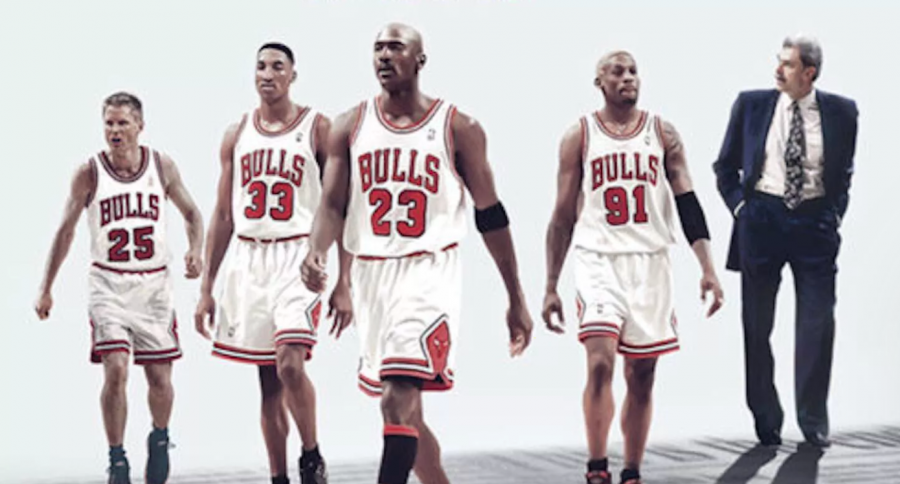The Last Dance Review: Episodes 1-4
May 11, 2020
Michael Jordan.
Just the name alone evokes feelings of greatness. Imagery of iconic buzzer beaters, impossible lay-ups, and physics-defying slam dunks that coined him the nicknames “Air Jordan” and “His Airness” immediately come to mind. And the reputation as the best NBA player of all time.
The Last Dance is a 10-part docuseries currently airing on ESPN chronicling Jordan’s rise to stardom through the lens of the legendary ‘90s Chicago Bulls team that won six NBA championships. Two episodes are released every Sunday through May 19, and to a world currently living without sports, this is an absolute godsend.
And that’s what the series is about: sports. Basketball, purely. I appreciate that it’s different from other documentaries that lure you in under the guise of “sports” only to use it as a segue to push a personal or political agenda. It’s about Michael Jordan’s transformation from a self-performer to a team-focused leader; how the meaning of win-at-all-costs had to evolve into relenting control and putting trust into the teammates around him, the management changes, team dynamics, and relationships between everyone in the organization that made it all possible.
Structurally, the documentary flip-flops between two timelines: the ‘97-’98 season, and the framework laid out in the years before. The latter follows the team’s coming together; from first drafting Jordan in 1984, to recruiting essential teammates Scottie Pippen and Dennis Rodman, and their six championship seasons through ‘91-’98. The other focuses entirely on just their last winning season that finally cemented the team as basketball royalty.
This structure is hard to follow for me. There are indications of time and place when the plot changes, but the show’s fast-paced nature negates the helpful nature of these clues. I often found myself asking my dad, “Wait, what just happened?”. If you aren’t beginning the show with a lot of knowledge about the Bulls (guilty) and you didn’t grow up in the ‘90s when all of this was current (guilty), then you might find yourself lost, too. Though with a ‘90s nostalgia just oozing out of the documentary, there are times I feel like a ‘90s baby myself.
The Last Dance’s name was picked out over two decades ago in 1997. Head coach Phil Jackson had a tradition to create a theme around each season.
“I talked to the players about particularly how important it was for us to really be together in this last run that we were going to have,” Jackson said. “So I called it The Last Dance.”
Togetherness.
A lot of time is spent driving home the point that their come-up to claiming one of the most dominant reigns in sports history could never have been a one-man job, no matter how talented or driven the individual players.The team’s journey to accepting that mentality is dissected as they undergo a coach swap from Doug Collins, strictly feeding Jordan the ball, to Phil Jackson opting for strategies not revolving solely around him. A glimpse of Jordan’s childhood reveals just how ingrained the competitive and win-at-all-costs mindset was for him and how much it took to develop an outward trust in his team. But, at the same time, how that same unparalleled competitive drive can be credited for much of his success.
The team’s frustration before reaching that milestone is amplified through the Chicago Bulls and Detroit Pistons’ rivalry. This is one of the juiciest threads to follow in The Last Dance and had me at the edge of my seat the entire time. I could practically taste the tension through the screen as it became more and more clear just how committed Jordan was to crushing his enemies.
Other than Jordan, episodes often hyper focus on other big contributors to his and the team’s journey. Whether it be Scottie Pippen’s tragedy of a contract, Dennis Rodman’s wild hair and habits, or Phil Jackson’s personal philosophy, each contributes a sense of three-dimensionality to the story being told.
The interviews might be my favorite part of the entire show. There is such a variety of subjects touched upon that all hold an immense value of their own within the greater context of the docuseries and in Jordan’s life: Jordan’s family—an obvious choice—as well as ESPN and Washington Post journalists, celebrities, former teammates, and even former rivals. The spectrum of people on that list represents just how far Jordan’s influence reached. And I found it really, really funny when Barack Obama’s credential appeared as “former Chicago resident” and similarly, Bill Clinton’s “former Arkansas governor.” Twitter said it best: Whoever’s writing these captions is the MVP of this doc. I agree.
One interview technique that I thought was pretty clever was when interview subjects were filmed watching footage of something someone else had said. Not only are their reactions priceless, but revealing in a way that otherwise would be inaccessible.
At one point Jordan is given an iPad to watch an interview in which Isiah Thomas, a former Piston of the Bad Boy era, downplays the non-hand-shaking controversy of the 1991 playoffs. Before even pressing play, Jordan scoffs and says, “You can show me anything you want. There’s no way you can convince me he wasn’t an a*****.” Nothing could have captured the essence of their feud like that.
(ESPN2 will be airing a censored version so that kids can watch, too.)
Like so many others, I am hooked on The Last Dance. Watching all of the intricate, seemingly separate storylines come together is a beautiful thing and I can’t wait to see how they continue to develop the narrative.
If you haven’t already started watching, do it now! Binge your way to the rest of us. We’ll want to be on the same page for the remaining episodes.


